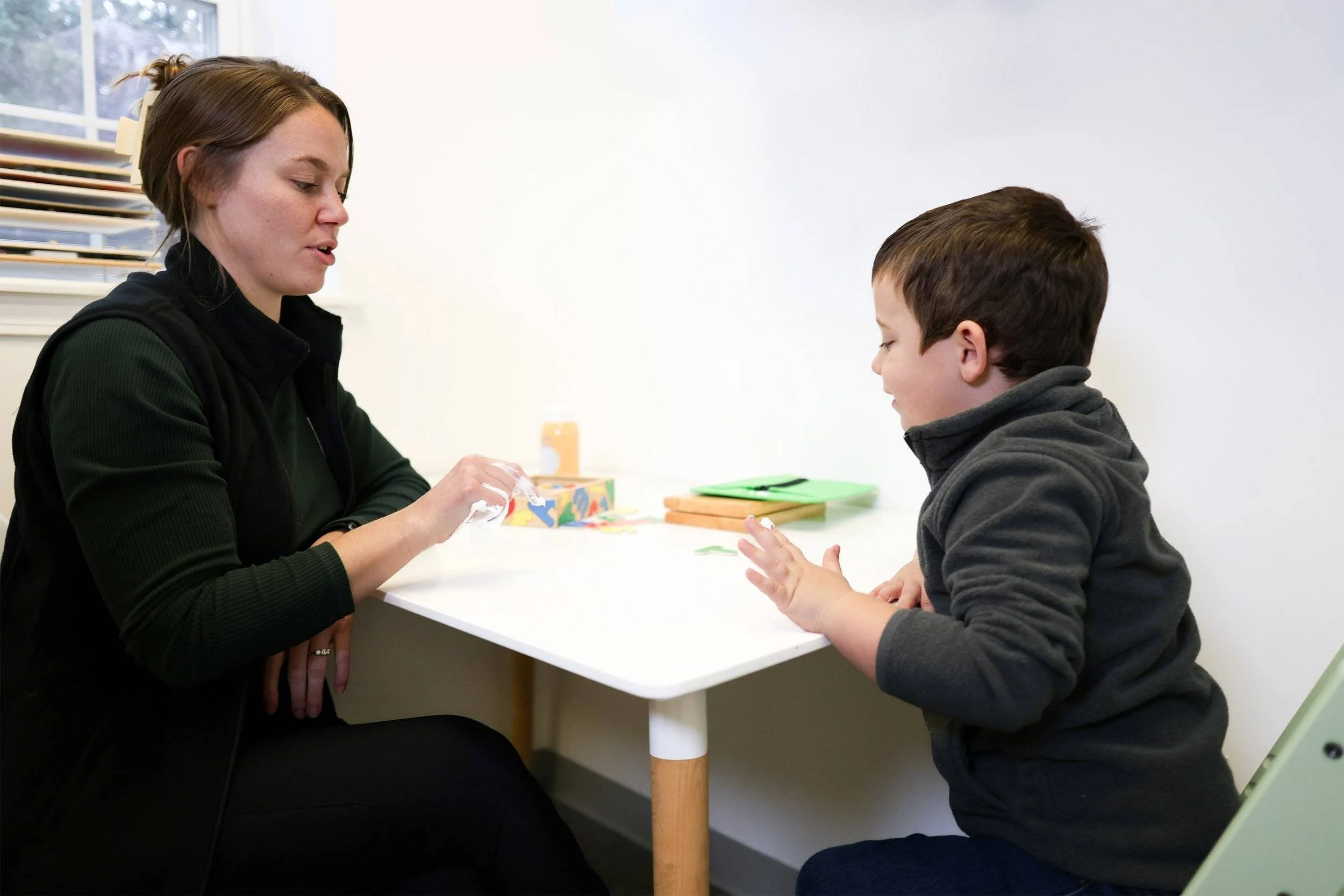Speech Therapy Services
Empowering Your Child Through Expert Speech Therapy
Unlock your child’s full communication potential with the guidance of a skilled speech-language pathologist. Through personalized strategies and targeted support, we help improve language development, articulation, and social communication skills, empowering your child to express themselves with confidence.
Building Skills, Confidence, and Independence
Building Skills, Confidence, and Independence
Your Child Will Love
Coming To Therapy!
Does your child have difficulty communicating? Don't worry! We have the expertise to assist. Our Speech-Language Pathologists have extensive training to help your child reach their full potential. Adaptive Pediatric Therapy provides excellent speech, language, social, and feeding therapies for children of all ages.
Speech
Does your child have difficulty communicating? Don't worry! We have the expertise to assist. Our Speech-Language Pathologists have extensive training to help your child reach their full potential. Adaptive provides excellent speech, language, social, and feeding therapies for children of all ages.
Language
From correct grammar to complex sentences, clear words can still not guarantee proper communication - when social language conventions like turn taking, eye contact and body language are overlooked. At Adaptive PT our speech therapists go the extra mile to help your child progress through language.
Articulation
Does your child struggle to be understood when speaking? It may be a speech sound disorder. Articulation issues occur when someone has trouble producing sounds, making them either substituted, omitted, added, or changed. Kids may make mistakes while learning new words, but it's considered a disorder if they don't correct the mistakes by a certain age.
AAC
Screaming, tantrums, hitting, biting or kicking – what looks like behavioral issues is often time a sign of an unmet sensory need or a lack of appropriate coping skills. A pediatric occupational therapist can help you and your child understand their triggers and find ways to proactively manage behavior.
Picky FeedinG
At Adaptive PT we are experts in treating children with feeding challenges. We understand that each patient is unique, so we tailor an individualized program to ensure your family's success. We provide support from birth through toddler. Let us provide the right expertise for you and your family!
Social
People with social/pragmatic issues may struggle in conversation, from rambling to using a lack of variety in their language. They may not take cues from body language and not be aware of others' lack of interest. These issues can hurt social acceptance, leading peers to avoid them. But there is help available.
Our Easy Three-Step Process
-
Step 1.
EVALUATION AND SCREENING
Does your child need extra help reaching their goals? Our experienced speech pathologists can help! We provide an evaluation and screening to diagnose the issue and develop individualized treatment and solutions for each of your child's unique needs. Give your kid the boost they deserve with Adaptive Pediatric Therapy.
-
Step 2.
CUSTOMIZED PLAN
Unlock your child's communication potential with Adaptive PT customized speech therapy plans. Our restorative exercises, treatment strategies, assistive technology, and playful movement activities are tailored to your child's individual or group setting. With help from us, your child will reach goals like clearer speech sounds, enhanced oral-motor control, improved chewing and swallowing, enhanced receptive skills, and language fluency. Let's get started!
-
Step 3.
TREATMENT SERVICE
Our treatment focuses on communication & cognition: speech, comprehension, expression, reading, writing, attention & more. Plus, expert evaluations for swallowing, food textures, safety, compensation & exercises. You can trust us for customized, quality care & follow-up.
Speech FAQ’s
Lorem ipsum dolor sit amet, consectetur adipiscing elit, sed do eiusmod tempor incididunt ut labore et dolore magna aliqua.
-
In most cases, no. Some insurance carriers/plans require you to have a script from your doctor. In general, however, you can book an appointment and begin treatment without having to go through your doctor. To be on the safe side, check your insurance plan for more details.
-
Sometimes. In the case of tongue thrust, for example, most kids will do so before they begin teething. However, early intervention in speech issues is critical to helping your child. If your child is showing signs of a speech disorder or learning disability, it’s a good idea to enroll them in speech language therapy as soon as possible.
It’s better for your child to have speech therapy and not need it, than to live with an untreated speech or language disorder.
-
Speech issues in children can have wide-ranging consequences. Beyond having a bit of a lisp or pronouncing words unusually, a speech issue can cause issues with their self-esteem. It can also signify deeper issues, like a learning disability or problems with their hearing.
Because they aren’t able to communicate as well as their peers, a speech issue in a child can cause them to have trouble making friends. This can stunt their growth socially.
Children with learning disabilities face greater challenges in life as well. According to research from the US Bureau of Justice, nearly a third of the inmates in the federal prison system have a learning disability, many of them untreated. Compare this with the 20% of the general population with a learning disability.
Children with untreated learning disabilities are more likely to be unemployed when they grow up as well, according to the US Bureau of Labor.
However, there is hope. Speech language therapy can help your child manage their learning disability or speech issues. They can still go to college, get a good job, and build a good life for themselves, and a speech language therapist can help.
-
Pediatricians don’t always have the training needed to be able to recognize when a child needs the services of a speech language therapist. They often take the “wait and see” approach. If you have a concern with your child, many pediatricians will provide you with a referral to see a speech therapist if you insist. However, if they won’t provide one, don’t worry – you likely don’t need a referral to see us here at District Speech. Don’t wait and see if your child has a speech/language delay. Set up an evaluation with District Speech and we will be able to provide definitive answers and strategies you can use today.
-
Speech therapists (SLPs) know the ins and outs of the oral motor structures and focus on the “act” of eating. If your child is having difficulty chewing/manipulating foods, keeping food in their mouth, taking a long time to chew/swallow, and/or are coughing a lot during meals, an SLP will do your evaluation. Occupational therapists (OTs) know all things sensory. If your child is showing difficulties with specific textures, flavors, colors of foods, temperatures, etc., an OT will do your evaluation. In many cases, children with feeding issues have both oral motor and sensory difficulties. We are help determine which type of therapy is best for your child. description
-
An evaluation allows a speech therapist the opportunity to assess your child’s development. This assessment may include a standardized test, observation through play, medical history information, and/or parent report. In most cases, it includes all four. Through the evaluation, it will be determined if treatment is necessary. Treatment at Adaptive cannot be initiated unless an evaluation has been completed.
-
Yes. Parents are a very important part of treatment at Adaptive Pediatric Therapy. Parents are often invited into the treatment rooms to observe therapy if the situation is appropriate, and parent education is an integral part of every therapy session. Each session is designed to allow time for the parent and therapist to discuss progress and what was done during the therapy session. Home programs are provided to the parent to increase carryover in all settings and help the child be more successful in reaching their goals.
THERAPY WITHOUT BOUNDARIES
THERAPY WITHOUT BOUNDARIES
Contact Us
Where Support and Progress Begin
Ready to support your child’s growth and development? Book a session with us today to start personalized therapy designed to meet your child’s unique needs. Whether it’s speech, feeding, or occupational therapy, we’re here to help them thrive every step of the way.







